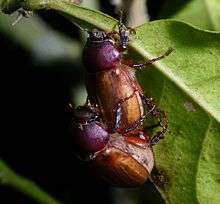Miridiba
| Miridiba | |
|---|---|
 | |
| Miridiba sp. | |
| Scientific classification | |
| Kingdom: | Animalia |
| Phylum: | Arthropoda |
| Class: | Insecta |
| Order: | Coleoptera |
| Family: | Scarabaeidae |
| Subfamily: | Melolonthinae |
| Tribe: | Rhizotrogini |
| Genus: | Miridiba Reitter, 1901 |
| Type species | |
| Miridiba trichophora (Fairmaire, 1891) | |
| Species | |
| |
Miridiba is a genus of beetle in the family Scarabaeidae, which are well known as white-grubs for their white larvae that are found under the soil where they feed on the roots of plants. The antennae end in a short club (shorter than the basal stalk). The mandible has a wrinkled molar lobe and the incisor lobe is depressed above. The lib or labrum is depressed in the middle. Species within this genus are found in the Old World mainly in eastern and tropical Asia. Some species in the genus were earlier considered as Holotrichia.[1]
References
- ↑ Coca-Abia, Maria Milagro (2008). "Revision of the Genus Miridiba Reitter, 1901 (Coleoptera, Scarabaeidae, Melolonthinae)". Zoological Science. 25 (6): 673–685. doi:10.2108/zsj.25.673.
This article is issued from Wikipedia - version of the 10/1/2016. The text is available under the Creative Commons Attribution/Share Alike but additional terms may apply for the media files.